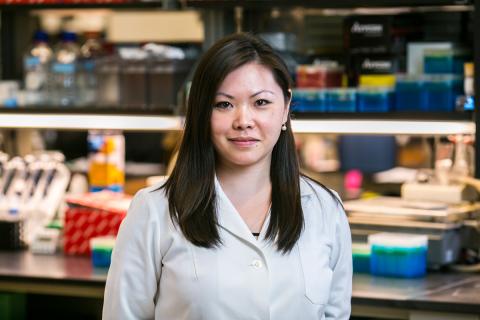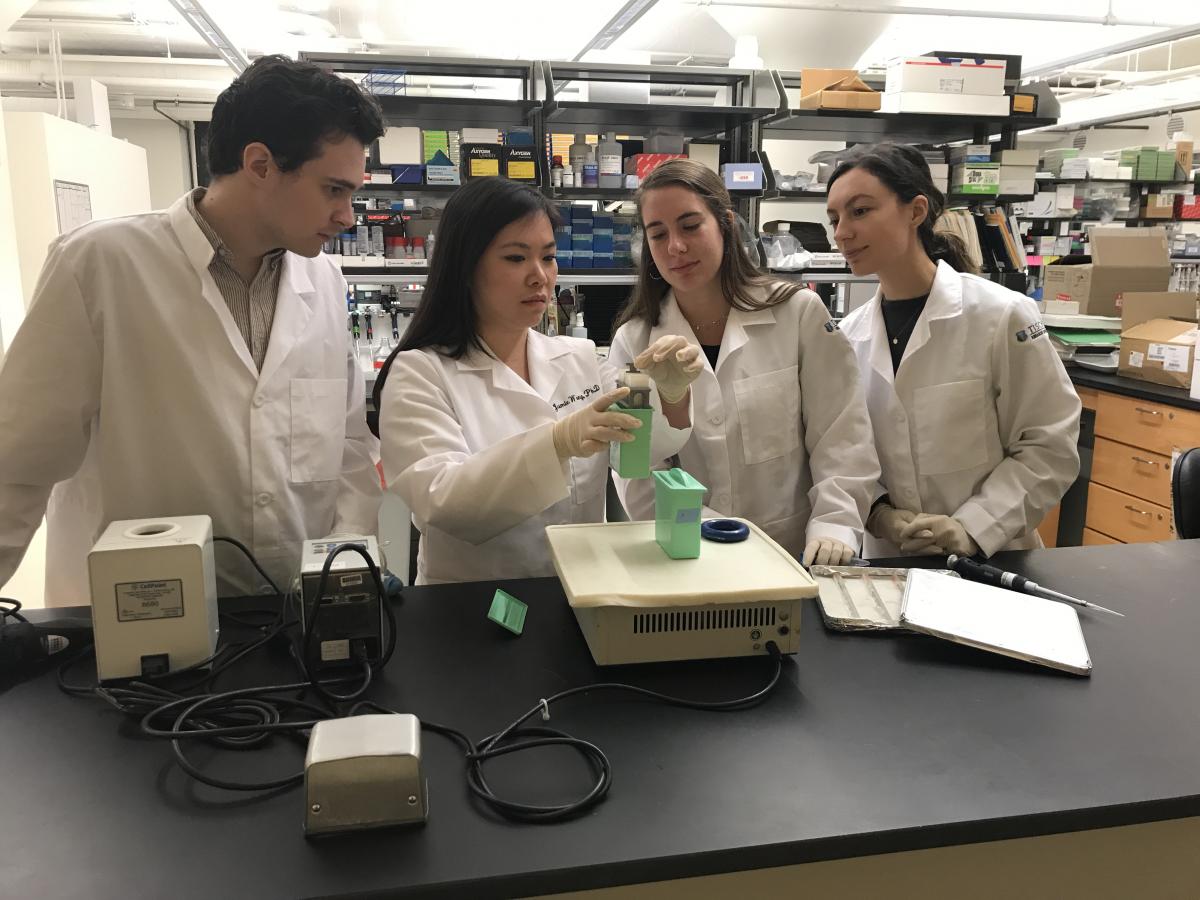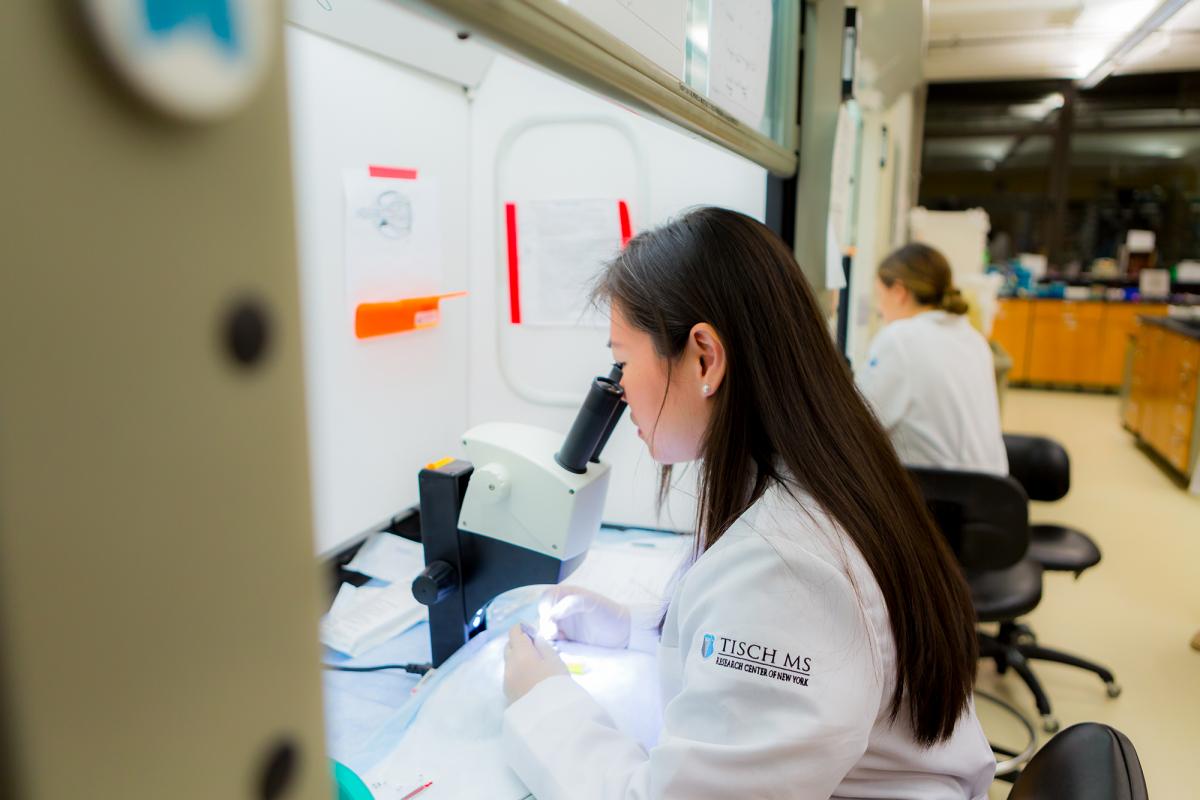
“The close proximity to the clinic is the most unique aspect of the Center. I have never seen any other research center where researchers have such a regular interaction with the clinicians and easy access to the patient samples.”
- Dr. Jamie Wong, Senior Research Scientist
Dr. Wong joined Tisch MSRCNY as a principal investigator in May 2015, after completing her postdoctoral training at Icahn School of Medicine at Mount Sinai. Her research career has been dedicated to studying pathophysiological mechanisms underlying central nervous system (CNS) injury and disorders, with the goal of identifying therapeutic targets to promote CNS regeneration and repair. Dr. Wong’s postdoctoral studies contributed to the elucidation of molecular signaling pathways and epigenetic mechanisms which can be manipulated to improve ischemic injury following stroke, and enhance axon regeneration following spinal cord injury.
At Tisch MSRCNY, Dr. Wong has used her surgical expertise to develop a novel animal model for primary progressive MS (PPMS), via intrathecal injection of cerebrospinal fluid (CSF) obtained from PPMS patients into the subarachnoid space of the cervical spinal cord in mice. This PPMS animal model exhibits hallmark characteristics of the disease including: demyelination, reactive astrogliosis and axonal damage in the cervical spinal cord, which consistently manifests as forelimb motor deficits. Additionally, Dr. Wong and her research team discovered that intrathecal delivery of PPMS CSF inhibits OPC differentiation into mature oligodendrocytes, resulting in impaired remyelination following lysolecithin-induced demyelination. In a series of CSF filtration studies, her team has demonstrated that toxic factors can be removed from PPMS CSF, which subsequently attenuates its capacity to induce clinical symptoms and pathology in the animal model. Dr. Wong is a member of the Neurapheresis Research Consortium, which is geared towards advancing the use of CSF filtration therapy in various neurological conditions.
Ongoing investigations in Dr. Wong’s research team are directed at: 1) understanding how glial dysfunction contributes to neurodegeneration, 2) understanding mechanisms underlying remyelination failure in PPMS, and 3) identifying pathological factors present in PPMS CSF which are responsible for causing and/or sustaining disease pathophysiology.
Dr. Wong received her Ph.D. in Biological Sciences in 2011, and B.S. in Neurobiology in 2004 from the Neurobiology and Behavior Department at University of California, Irvine. Her thesis work focused on evaluating the impact of plasticity-promoting drugs and motor training on locomotor recovery following spinal cord injury.


SELECTED ABSTRACTS
2023
- Gao, I., Griffin, R.P., Wong, J.K., and Sadiq, S.A. 2023. Bax inhibitor protects against apolipoprotein B-100-induced human motor neuron degeneration in vitro. American Academy of Neurology Annual Meeting.
- Griffin, R.P., Gao, I., Wong, J.K., and Sadiq, S.A. 2023. Healthy astrocytes provide neuroprotection against apolipoprotein B-100-induced motor neuron degeneration. American Academy of Neurology Annual Meeting.
2022
- Gao, I., Griffin, R.P., Celestin, N.M., Wong, J.K., and Sadiq, S.A. 2022. Filtration attenuates sporadic ALS CSF-induced motor neuron death in vitro. American Academy of Neurology Annual Meeting.
- Griffin, R.P., Gao, I., Celestin, N.M., Wong, J.K., and Sadiq, S.A. 2022. Degeneration of upper and lower motor neurons in a novel CSF-mediated animal model of sporadic ALS. American Academy of Neurology Annual Meeting.
- Wong, J.K., Gao, I., Griffin, R.P., and Sadiq, S.A. 2022. Apolipoprotein B-100 induces neurotoxicity in a novel CSF-mediated animal model of sporadic ALS. Society for Neuroscience.
- Gao, I., Griffin, R.P., Wong, J.K., and Sadiq, S.A. 2022. Apolipoprotein B-100 in sporadic ALS CSF induces human motor neuron degeneration. Society for Neuroscience.
- Griffin, R.P., Gao, I., Wong, J.K., and Sadiq, S.A. 2022. Upper motor neuron degeneration is induced by apolipoprotein B-100 in a murine model of sporadic ALS. Society for Neuroscience.
2021
- Celestin, N.M., Wong, J.K., and Sadiq, S.A. 2021. Antibodies in primary progressive multiple sclerosis CSF impair remyelination of lysolecithin-induced lesions. Society for Neuroscience.
- Shue, T.M., Beaty, J.M., Celestin, N.M., Wong, J.K., and Sadiq, S.A. 2021. Sporadic ALS cerebrospinal fluid induces pathological translocation of TDP-43 in motor neurons. American Academy of Neurology Annual Meeting.
- Celestin, N.M., Shue, T.M., Beaty, J.M., Wong, J.K., and Sadiq, S.A. 2021. Filtration reduces neurotoxicity of sporadic ALS cerebrospinal fluid in a mouse model. American Academy of Neurology Annual Meeting.
2020
- IgG depletion ameliorates pathogenic effects of primary progressive MS CSF
- Filtration of primary progressive MS CSF attenuates reactive astrogliosis in vitro and in vivo
- Differences in neurotoxic effects of cerebrospinal fluid from sporadic and familial ALS patients
- Filtration of sporadic ALS cerebrospinal fluid ameliorates motor deficits and pathology in an animal model
- Beaty, J.M., Shue, T.M., Roselle, A.K., Wong, J.K., and Sadiq, S.A. 2020. Filtration of primary progressive MS CSF removes factors causing delayed remyelination of lysolecithin lesions. 8th Joint ACTRIMS-ECTRIMS Meeting.
- Wong, J.K., Shue, T.M., Beaty, J.M., Vernejoul, J.B., Lin, J., and Sadiq, S.A. 2020. Pathological effects of primary progressive MS cerebrospinal fluid are antibody-mediated. 8th Joint ACTRIMS-ECTRIMS Meeting.
2019
- Cerebrospinal fluid pheresis may have therapeutic value in primary progressive multiple sclerosis
- Cerebrospinal fluid of primary progressive MS patients impairs remyelination in an experimental model of multiple sclerosis
- Intrathecal delivery of ALS cerebrospinal fluid induces motor deficits and motor neuron death in mice
- Experimental evidence that disease pathogenesis in sporadic ALS is unique and distinct from that seen in familial ALS
Tisch MS Research Center of New York
521 West 57th Street
4th Floor
New York, NY 10019
(646) 557-3900
Support Tisch MS
Support Tisch MS and our innovative research leading to treatments that improve the lives of patients.
